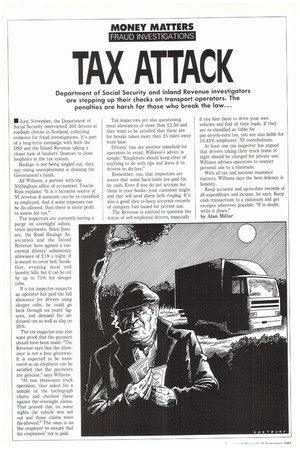TAX ATTACK
Page 46

If you've noticed an error in this article please click here to report it so we can fix it.
/ Last November, the Department of Social Security interviewed 300 drivers at roadside checks in Scotland, collecting evidence for fraud investigations. It's part of a long-term campaign with both the DSS and the Inland Revenue taking a closer look at hauliers' finances to close loopholes in the tax system.
Haulage is not being singled out, they say: rising unemployment is draining the Government's funds.
All Williams, a partner with the Nottingham office of accountant Touche Ross explains: "It is a lucrative source of NI revenue if someone can be re-classified as employed. And if some expenses can be dis-allowed, then there is more profit to assess for tax."
Tax inspectors are currently having a purge on overnight subsistence payments. Since January, the Road Haulage Association and the Inland Revenue have agreed a taxexempt drivers' subsistence allowance of £19 a night: it is meant to cover bed, breakfast, evening meal and laundry bills, but it can be cut by up to 75% for sleeper cabs.
If a tax inspector suspects an operator has paid the full allowance for drivers using sleeper cabs, he could go back through six years' figures, and demand the additional tax as well as slap on 35%.
The tax inspector may also want proof that the payment should have been made: "The Revenue says that the allowance is not a free giveaway. It is expected to be monitored so an employer can be satisfied that the payments are genuine," says Williams.
"At one three-man truck operation, they asked for a sample of the tachograph charts and checked these against the overnight claims. That proved that on some nights the vehicle was not out and those claims were dis-allowed." The onus is on the employer to ensure that his employees' tax is paid. Tax inspectors are also questioning meal allowances of more than £1.50 and they want to be satisfied that these are for breaks taken more than 25 miles away from base.
Drivers' tips are another minefield for operators to avoid. Williams's advice is simple: "Employers should keep clear of anything to do with tips and leave it to drivers to declare."
Remember, too, that inspectors are aware that some back-loads are paid for by cash. Even if you do not account for them in your books, your customer might and that will send alarm bells ringing. It's also a good idea to keep accurate records of company fuel issued for private use.
The Revenue is entitled to question the status of self-employed drivers, especially if you hire them to drive your own vehicles and find all their loads. If they are re-classified as liable for pay-as-you-earn tax, you are also liable for 10.45% employers' NI contributions.
At least one tax inspector has argued that drivers taking their truck home at night should be charged for private use. Williams advises operators to restrict personal use to a minimum.
With all tax and national insurance matters, Williams says the best defence is honesty.
Keep accurate and up-to-date records of all expenditure and income, he says. Keep cash transactions to a minimum and get receipts wherever possible: 'If in doubt, write it down."
by Alan Millar




















































































